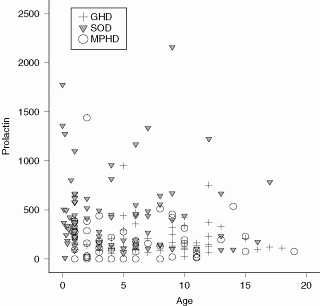BSPED2011 Poster Presentations (1) (84 abstracts)
What does prolactin measurement add to the evaluation of pituitary hormone function?
Emma Webb , Pietro Lazze , Carly Reddington & Mehul Dattani
Institute of Child Health, London, UK.
Background: Prolactin concentration is frequently measured as part pituitary function assessment, however there is little published data regarding result interpretation.
Objective: To compare serum prolactin concentrations in children with isolated GH deficiency (IGHD), multiple pituitary hormone deficiency (MPHD) and septo-optic dysplasia (SOD).
Methods: Patients were assigned to the appropriate study group based on the results of their endocrine investigations and MRI brain. (IGHD – peak stimulated GH <6.7 μg/l, MPHD ≥1 pituitary hormone deficiency, SOD ≥2 of; optic nerve hypoplasia, midline brain abnormalities and pituitary hormone insufficiencies), MPHD prolactin assays were performed in duplicate using the Immulite 2500 solid-phase, two-site chemiluminescent immunometric assay. Prolactin concentrations were compared using analysis of covariance, controlling for age at test and sex.

Results: Individuals with SOD had significantly higher prolactin concentrations than those with IGHD or MPHD (P<0.001). One child with SOD and 12 with MPHD had prolactin concentrations ≤20 mIU/l. Although the mean prolactin of the IGHD and MPHD patients was the same if all individuals with prolactin deficiency were excluded from analysis the MPHD cohort had a significantly higher mean prolactin than the IGHD group (MPHD, 259 mIU/l; IGHD, 163 mIU/l, P<0.04).
Conclusion: It has previously been reported that SOD, which can be caused by mutations in genes involved in hypothalamic development (e.g. HESX1 and SOX3), is associated with hypothalamic dysfunction. A cohort of children with MPHD also appears to have a degree of hypothalamic dysfunction. Although 25% of individuals with MPHD were prolactin deficient, the remainder had a raised prolactin compared to individuals with IGHD. These findings may have implications for understanding the genetic aetiology of MPHD, which so far has only been associated with mutations in pituitary specific genes (e.g. PROP1 and PIT1).
 }
}



